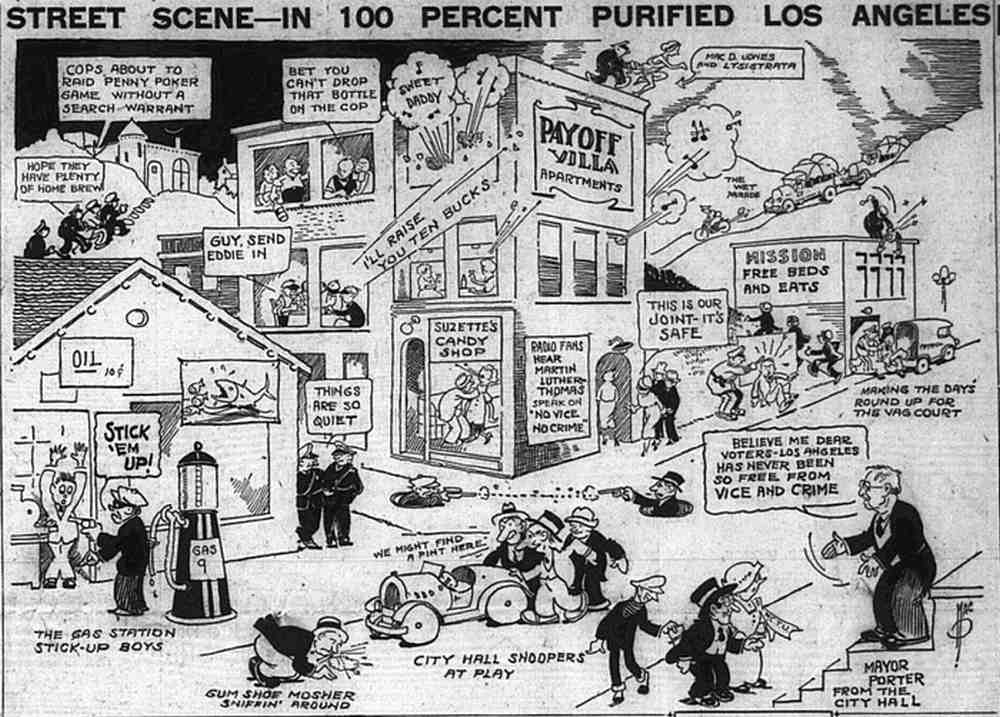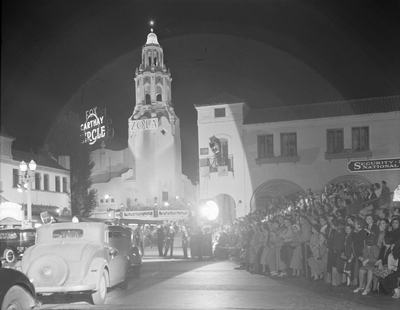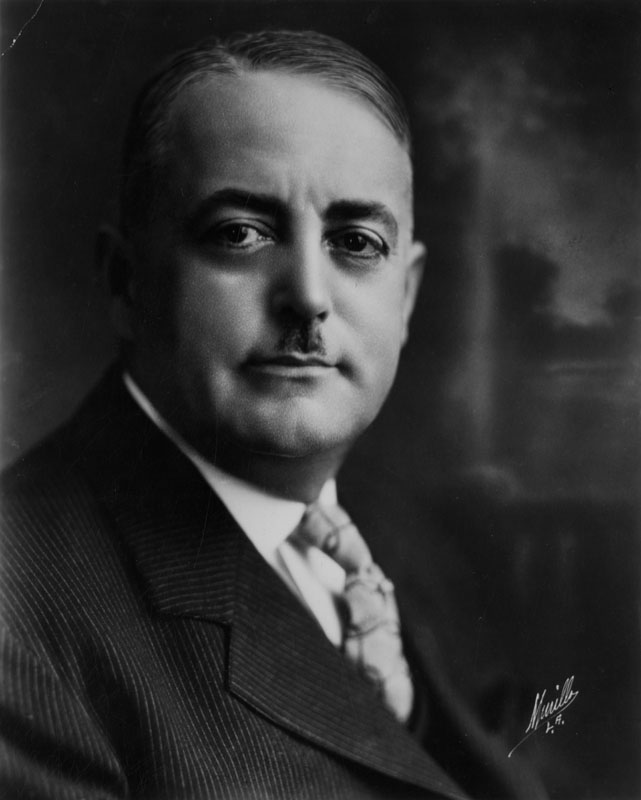Politics in Los Angeles has long been a dirty and corrupt business. This was never truer than during the 1930s.
I found this wonderful cartoon in an issue of the Evening Herald & Express. Any citizen of Los Angeles who was paying attention would have known exactly who all the players were. I didn’t understand several of the references and so I thought it might be fun to try to decipher them.
Here is the cartoon, and below that is my key to understanding just what in the hell the cartoonist was talking about.

On the second floor of the Payoff Villa Apartments one of the gamblers says: “Guy, send Eddie in.” The gambler was referring to Guy McAfee. McAfee, like thousands of others, had moved from the midwest to Los Angeles years before seeking his fortune. He didn’t find it as a firefighter, which he worked at for a while. But things began to look up for him when he joined the LAPD. His career trajectory ultimately landed him in the position of head of the vice squad. Oh, delicious irony! While serving as the head of the vice squad, McAfee owned brothels and gambling dens.

Guy McAfee and his wife, June in 1939.
In the late 1930s, when it appeared that LA might become less tolerant of vice (the possible crackdown was a momentary hiccup in the ongoing criminal enterprise that the city had become), McAfee moved to Las Vegas, Nevada. Bugsy Siegel gets the credit, or blame depending on your view, for establishing the desert gaming mecca, but it was men like Guy McAfee and his associate Milton B. “Farmer” Page who really kicked things off in the sleepy little cow town. McAfee was the co-founder of the Pioneer Club and was the President of the Golden Nugget until his death in 1960.
The “Eddie” referred to in the cartoon bubble was Eddie Nealis, a local bookmaker. Eddie’s name along with his fellow vice kings: Guy McAfee, Farmer Page, Tudor Scherer, Jack Dragna and Johnny Roselli, came up in the Los Angele County 1937 Grand Jury investigation into vice. Most of those named fled the city for Vegas in 1938.

Carthay Circle Theater c. 1937
On the roof of the Payoff Villa Apartments, you will find a cop named Mac D. Jones. He appears to be shoving a woman in a toga over the edge. Lysistrata is mentioned. Lysistrata was Greek play written by Aristophanes. This reference threw me for a loop. I couldn’t figure out what a cop had to do with the play. But I found out. The play, written in 411 BC, is a comedy in which a woman, Lysistrata, embarks on a mission to end the Peloponnesian War. And how does she plan to do it? Get all of the women of Greece to withhold sex from their husbands and lovers so that they’ll snap to their senses and negotiate peace. It still seems like a solid plan.
Apparently, Officer Mac Jones wasn’t a lover of Greek plays, he raided the show twice while it was on stage at Carthay Circle Theater (the beautiful 1926 building was demolished in 1969–a bad year for many reasons). The cast filed a suit against Jones in the amount of $226,000 for damages. The judge who heard the case, Superior Court Judge Willis, was evidently no lover of Greek theater either He said that there were two scenes that “as written and acted are sufficient in the mind of the average person to condemn the play as indecent and obscene as hereintofore defined, and there can be found nowhere in the play any redeeming or ameliorating quality of uplift, or lesson, or message of good.” Judge Willis threw out the demand for damages. I happen to love the play for many reasons, one of which is its powerful anti-war stance.
A poster on the exterior wall of the Payoff Villa Apartments exclaims: “Radio fans hear Martin Luther Thomas preach on ‘No Vice, No Crime.'” I was intrigued. Who was Martin Luther Thomas? It turns out that Thomas was one of several local radio preachers who, when he wasn’t railing against the “Underworld”, was the chief investigator for City Prosecutor Johnson.
And the fellow crawling on his hands and knees in the street? He was Wells J. Mosher, confidential secretary to Mayor Porter.
In July 1931 Thomas and Mosher were linked by a so-called “snooping system” they allegedly ran to gather dirt on other city employees–particularly members of the city council. Director Knox of the Bureau of Budget and Efficiency was told to file a report with the Efficiency and Personnel Committee of the City Council. The report was specifically ordered to address whether or not Thomas and Mosher should lose their jobs. One of the councilmen declared that the two men were costing the city money that could be put to better use.
Mayor John Clinton Porter was a teetotaler and a xenophobe. Porter’s promise to clean-up the city’s political system won him the election in 1929, but it didn’t win him any friends on the wrong side of the law. Once sworn in the mayor began receiving death threats. He was the only mayor in LA’s history to be the victim of an attempted assassination.
On February 19, 1932, a federal warehouse worker, Jacob Denzer, who kept watch over confiscated booze, sat in the mayor’s lobby awaiting an audience. The self-proclaimed “messenger of the Lord” had had a vision for a “divine plan of salvation.” When 50 Fullerton Junior High School students, on a tour of City Hall, started to crowd into the lobby Denzer became agitated. He stood up, waved his gun and shouted at the startled students to “Get out of here, all of you.” A city janitor saw the ruckus. He managed to grab the revolver from Denzer’s hand.

Frank L. Shaw
Porter came through a recall effort and presided over the 1932 Olympic Games. Ever the teetotaler, no alcohol was served at the opening ceremony.
Porter enjoyed being mayor and ran in 1933, only to be defeated by arguably the most corrupt mayor in Los Angeles’ history, Frank L. Shaw (who, by the way, was recalled in 1938).
